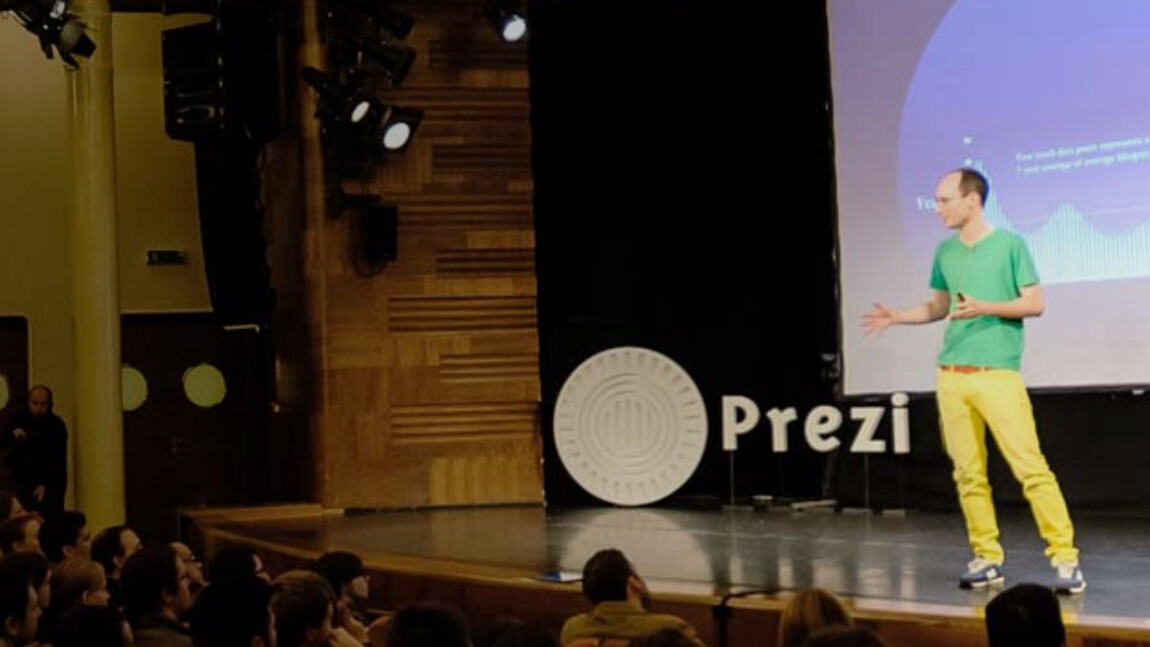
Building a startup anywhere is hard, but it’s especially difficult if you’re based in a country that isn’t a huge market itself. One company that has managed to make it big despite such a restriction is Prezi, which designs and creates ‘zooming’ presentation software – a cloud-based presentation and storytelling tool for sharing ideas on a virtual canvas.
We sat down with co-founder Adam Somlai-Fischer. Prezi has been used by over 40 million people and 80 percent of Fortune 500 companies. Prezi was established in Budapest, Hungary in 2009 and the word ‘prezi’ is the Hungarian short form of ‘presentation.’
Along with co-founders Peter Arvai and Péter Halácsy, Adam recently took the prize in the European tech startup competition The Europas in the ‘Best Startup Founder or Co-founders’ category.
Q: How can you build a successful global startup from a small country such as Hungary?
At Prezi, we decided to go for the international market right after we launched our website. Obviously for an internet startup that meant going to San Francisco. If you want to build a global brand, there is currently one market that will determine your long-term potential, and that is the US.
In the case of Prezi, the presentation culture in the US was stronger than in Europe. This was a market we had to target if we wanted to reach critical mass. It relates to the number of users speaking the same language, the number of investors with global ambitions, and the number of advisors who can help you navigate the troubled waters of building a company. So, my advice is to go there, learn, absorb the knowledge and build your global network!
As a European, I can’t tell you to avoid starting a company in Europe. In fact, I believe that people living in Europe are misjudged by Silicon Valley at the moment — particularly by those scrambling to find engineers. There are some great European successes stories with transatlantic setups. Just think of Skype, Spotify, and SoundCloud.
Having said that, the reality is — and probably will be for the next few decades — that no matter where you start, if you’re an entrepreneur who’s dreaming of building a global brand, the U.S. market will be your key to success or failure.
Q:In nutshell, what is your story?
I built the original prototype, the first version of Prezi. I was a pretty successful, internationally known, renowned visual artist. I was often invited to give presentations about my projects and found that a zoomable user interface (ZUI) enabled me to explore the “big picture” overview of my ideas, and then zoom into the details of individual projects.
Since no commercially-available zooming presentation editor existed, I started hand coding a ZUI for each presentation I gave. Peter Halacsy, my co-founder (then a professor at the Budapest University of Technology and Economics) saw one of my presentations and he liked it a lot. It was in 2007 and as he also had to give a presentation he approached me about using the software.

After making his presentation, we realized we might have something on our hands so we started to work on putting together something everyone could use. But neither of us knew much about running a company, so we reached out to the only person we knew who did, Peter Arvai.
He convinced me and Peter and me that the only way to succeed with our ideas was to leave our jobs and spend 100 percent of our energy on Prezi. The first year, the company had close to zero funding. After working without salaries for 18 months we launched Prezi in April 2009 from Budapest and five months later we established our San Francisco office.
Don’t miss: 5 tips for a successful pivot
Q: Any comments on your company policy/culture? Is Prezi already a corporation?
We will always be a startup. Being a startup is a cultural question. For us, it is more about how fast can you react when you need to change? How much ownership does an individual engineer have? How much flexibility do we offer to our people? And not only when it comes to deciding what time they come to the office, but also how an issue get solved.
If you judged us on the way we treat our customers, then we’re still a startup because we do our best to be completely honest with them. And we encourage everyone at Prezi to oppose everything. We are happy when people comes up with new ideas and they stand up for their opinion even If it differs from ours. We like when they oppose our decision and challenges us and each other with the new approaches. I think it plays a crucial part in our success. As sometimes we only know what do we want to reach but have no idea how to do that it plays a vital role at Prezi.
Presentation tips Prezi, by Leonor Vale
Q: Some real tips for young startups with tight budgets? List 5-10 free tools they should use…
Money will just ruin your focus. So you are lucky being on tight budget. Specifically, in European startup competitions what I see a lot is that people learned the basics of how to start a startup, but the ideas and projects are lagging behind a bit. So free tools to help you:
Number 0 – team: You need to find people who inspire you, complement you and you inspire them too. People are key – and be open, open your heart and give space to people joining you.
Number 1 – thinking: Please think hard. Is your idea great, amazing new value to people? It has to be. If it’s another XYZ, you won’t win, you can’t compete with large companies if you do just the same. But don’t worry, if you are not there yet, just give space and time for thinking. Good ideas need time and iterations and maturing.
Number 2 – feedback from reality: Your ideas will matter if they make sense, (and offer) value to others. So test it; don’t focus on startup competitions. Focus on your market, on people. Find them, strangers, test your early prototypes. Just go to a café, ask people for help. Your first ideas will suck, but you will get inspiration from these tests.
Number 3 – keep learning: If you don’t have budget for 10 coders? 10 designers? 10 copywriters? Please learn the most essential skills. You can learn anything, there are great resources online for anything really. I did learn coding as an architecture students just to be able to code the 1st Prezi prototype 10 years ago. It was only 70 lines of code, but it worked.
Q: Bootstrapping, angel investors, VCs? What is your take on this? (do not be afraid to talk bad about your investors – they will not read this :)
When we started to work on Prezi, the recession just hit the World and Europe, so for a startup starting from Hungary aiming to take over Microsoft, Google and Apple it was nearly impossible to get any investment. So we just built our product on shoestring budget, making some money by selling individual presentations with design and our new technology as a service.

Once it got out, people loved it. (They) talked about us on Twitter, like “love at first use.” Our first VC partner, Christian Jepsen from Sunstone saw this, and approached us. Luckily, by this time we were cashflow positive, so we could wait and find the perfect partner.
And this is the key, it’s about smart money, not money. Sunstone did help others before in moving to the US market from Europe. Its a steep learning curve, and they helped us a lot.
Don’t lose focus from your customers. Its better to be a medium elevator pitcher with a great product and lots of users, than a great hustler without anything to offer.
Q: Any tips how to balance private life with work when you run a global startup?
I think its all about focus. If you can focus on your work, when its needed, and when you spend time with your loved ones, you need to focus fully there. At Prezi we trust everyone, all our employees, so its not just about me, that we are all intrinsically motivated. Therefore we don’t have set working hours. The only thing that matters are the results.
As grownup personalities, you should learn yourself, what balance you need to give us the best results. Yes, we work very hard, and don’t burn out. How to reach this balance, is something each individual has to understand and develop for themselves.
Willow Brugh creates Prezi presentations from hand-drawn notes
Q: You saw thousands of presentations? Do the very best presentations have anything in common (apart of charisma of person who presents)?
Beyond the usual advice, I think if they involve the audience, and create a discussion-like experience, it works better. It’s said that good DJs feel the response from the dancers, and choose music the create euphoria. I think the same goes for presentations.
The best presenters from all over the world not only good storytellers but they also use landmarks, visual landmarks to tell their story. Humans think visually. Fact. We look for landmarks, shapes, and then associate them with meaning. For example, when I travel, and the keyboard is suddenly upside down on the cash machine, i have a really hard time remembering my pin code, since my brain associated the number, the information with the form, shape.
You can prepare, yes, you can plan, yes, but once on stage, it’s the audience that will define what goes through and what gets forgotten. Feeling their interests, responses is key. And here Prezi comes in strong. With a well structured Prezi, you and respond to questions, zoom in the show further details, while the whole will never be crowded, since you can articulate that with scale, size of information on your canvas.
Basically you both get a clean presentation, and all the information can still be there prepared, in case your audience shows interested in something specific.
Q: Your plans for the future?
Prezi is changing how people develop and share ideas. 40 million (users) is far from the global population who could benefit from our work. As for me, personally, we started an experimental lab within Prezi, called Delight Research Lab, where we do really exciting, although secret, things. I get to use both strategic thinking, and hands-on skills to play with the future.
Don’t miss: 16 surprising things you learn about yourself when starting a business
Get the TNW newsletter
Get the most important tech news in your inbox each week.






